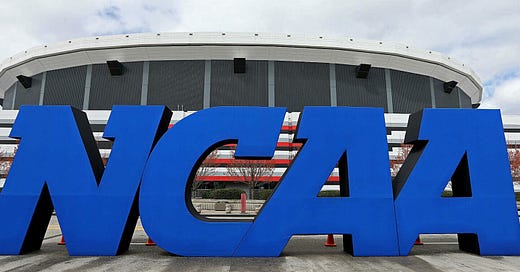NCAA Considers Easing Restrictions on Pro Sports Betting for Athletes and Staff
The NCAA is weighing a significant shift in its sports betting policy that would allow athletes and staff members to place bets on professional sports, while intensifying enforcement efforts on college sports betting and activities that directly affect game integrity.
This proposal, introduced by the Division I Council, will be up for consideration this fall. If adopted by Division I, the measure must also gain approval from Divisions II and III before it can be implemented.
Under the proposed changes, betting on college sports would remain strictly prohibited. Athletes and staff would also continue to be barred from sharing insider information related to college athletics or associating with gambling-related advertising or sponsorships at NCAA championship events.
The potential policy change comes as legalized sports betting continues to expand across the United States. NCAA President Charlie Baker and other collegiate sports leaders have voiced concern over increased harassment of student-athletes by bettors on social media and have responded to allegations of betting-related misconduct involving college programs.
The NCAA acknowledged that it has resolved multiple sports betting violations involving staff members in recent years, and that additional cases are currently under investigation. The organization’s enforcement staff, including a newly formed sports betting integrity unit, is actively issuing notices of allegations related to ongoing cases.
Despite current NCAA rules barring all forms of sports betting by athletes and institutional staff, enforcement has become increasingly difficult—especially when it comes to professional sports. Two years ago, the NCAA eased reinstatement penalties, recognizing the challenges of maintaining an "abstinence-only" policy in an environment where pro sports betting is now mainstream and accessible.
“NCAA rules prohibiting sports betting at all levels were written and adopted at a time when sports gambling was largely illegal nationwide,” said Josh Whitman, athletics director at Illinois and chairman of the Division I Council. “As betting on sports has become more widely accepted across the country, Division I members have determined that further discussion of these sports betting rules is warranted, particularly as it relates to the potential distinctions between betting on professional vs. collegiate sports.”
Under current rules, any athlete who bets on their own team or sport risks a lifetime ban from college competition.
Jon Duncan, NCAA vice president of enforcement, noted that the number of sports betting cases has significantly increased in recent years. “Our staff—including our new sports betting integrity unit—has been effective in detecting and pursuing violations,” he said.
NCAA Chief Medical Officer Dr. Deena Casiero said the proposal may represent a more practical and health-conscious approach than blanket bans. “By meeting student-athletes where they are, schools may be more effective at preventing, identifying and supporting student-athletes with problematic gambling behaviors,” Casiero said.
The NCAA also made several other key announcements this week:
Roster Limits & Revenue Sharing: The Division I Board of Directors formally adopted roster limits for all sports, a step related to the recent $2.8 billion House settlement. The changes also allow schools to distribute revenue and offer unlimited scholarships within the roster caps.
Basketball Scheduling Cap: A proposal was endorsed to cap both men’s and women’s regular-season basketball schedules at 32 games starting in 2026-27. Critics, including early-season tournament organizers, argue the move could reduce the number of high-profile matchups.
Women's Flag Football Expansion: The Council introduced a proposal to add women’s flag football to the NCAA’s Emerging Sports for Women program. The sport is gaining momentum and is set to make its Olympic debut at the 2028 Los Angeles Games.
FCS Football Scheduling Flexibility: Starting in 2026, FCS teams will be allowed to schedule 12 regular-season games annually—an increase aimed at improving competitive opportunities.
New Championships for Emerging Sports: Proposals were introduced to establish NCAA championships for women’s stunt and women’s acrobatics and tumbling as early as spring 2027. These proposals also require approval from Divisions II and III.
Fencing Championship Scoring Overhaul: A new scoring system was introduced to allow for separate recognition of men’s and women’s fencing teams. Under the current format, women’s-only teams cannot win the national title outright. This change will also require approval from the other divisions.





